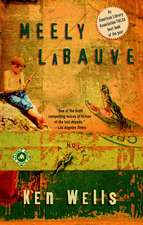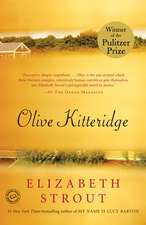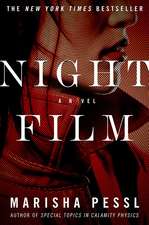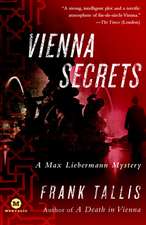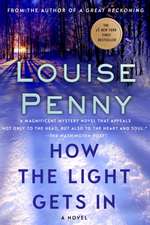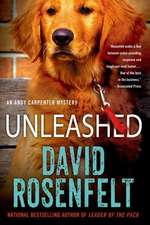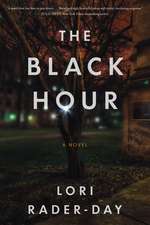MacGregor Tells the World
Autor Elizabeth McKenzieen Limba Engleză Paperback – 31 mai 2007 – vârsta de la 14 până la 18 ani
Twenty-two-year-old MacGregor West, orphaned as a boy, is on a quest: to understand the circumstances of his mother’s untimely death. On a foggy San Francisco evening, guided by an old stack of envelopes, Mac finds himself at the mansion of cultural icon Charles Ware, where he encounters the writer’s beautiful and enigmatic daughter, Carolyn, trapped in a fold-up bed. Upon freeing her, Mac plunges headlong into the world of the eccentric Ware family and a love affair with a woman whose murky history may be closely linked to his own.
MacGregor Tells the World is a poignant and often hilarious ride through present-day San Francisco, a city brimming with memorable characters who help Mac discover just what story is his to tell.
Praise for Elizabeth McKenzie’s Stop That Girl
“Elizabeth McKenzie is an accomplished humorist and a developed stylist, and she wastes no time dazzling the reader with her clean direct language, her simple but searing use of metaphor and her unflinching eye.”
–The New York Times Book Review
“Single-handedly reinvigorate[s] the coming-of-age genre. . . . Here is a writer to watch, and a book to breeze through with glee.”
–San Francisco Chronicle
Preț: 105.41 lei
Nou
Puncte Express: 158
Preț estimativ în valută:
20.17€ • 21.10$ • 16.76£
20.17€ • 21.10$ • 16.76£
Carte disponibilă
Livrare economică 13-27 martie
Preluare comenzi: 021 569.72.76
Specificații
ISBN-13: 9781400062256
ISBN-10: 140006225X
Pagini: 259
Dimensiuni: 135 x 203 x 15 mm
Greutate: 0.2 kg
Editura: Random House Trade
ISBN-10: 140006225X
Pagini: 259
Dimensiuni: 135 x 203 x 15 mm
Greutate: 0.2 kg
Editura: Random House Trade
Extras
1
Above all, the quest.
MacGregor West—Mac, or simply West, or even Ho-ho, or sometimes just Soldat duBois—had been walking past a certain Pacific Heights mansion in the city of San Francisco over the course of several weeks. He’d been recently delivered a shoe box full of his mother’s loose ends, and a stack of empty envelopes in it had borne this return address—as much to go on as anything he’d ever possessed. It had brought him to the outside of a place that looked more like a civic building than a residence. But he could not get up the nerve to apply his knuckles to the door.
June. The hemisphere was heating up, all over but here. Fog rising in floes off the bay. Housekeepers and nannies, gardeners and florists, all wrapping up their work for the day. Quaint bumps in the sidewalk, approved bumps, because nothing was out of place around here. An older couple strolled by, walking pugs in handsome sweaters. “Evening,” Mac said. “Good evening,” they replied. Around here, the animals dressed better than he did.
How many serfs had it taken to quarry and haul this granite here, to build this looming edifice? Tonight balloons tied to the front posts smacked lightly against one another in the mist, and the windows flickered with childish silhouettes. Not the time to knock and ask about a matter concerning only him.
Even so, his talent for loitering was rewarded. The front door flew open, and he froze beside the trunk of a street-side mock orange tree to see who emerged.
Not a who—a what. A bed on wheels. The sort that folds in half like a sandwich and rolls squeaking out of the closet when a guest appears. This one was being yanked onto the front landing by a handful of adolescent girls. And with a full-size person wedged within the frame, thrashing and trapped—the unexpected sight seemed like an omen. Two bare soles protruded from one side, a set of shoulders and a downward-facing head from the other. One mischievous girl peered up and down the street. Others were busy securing the bed with string. Then, to Mac’s surprise, they all dashed back into the house. Firmly shutting the door. Leaving the bed alone outside.
He heard a muffled “Help!” His mouth felt dry. Should he butt in? Spoil the game? “Help,” the voice cried again, and he ambled over to offer a hand.
“This as serious as it looks?” he asked.
Her face was upside down, hidden by a spread of auburn hair as full as a hula skirt. “Very!” she said. “My narm is numb.”
“That’s the worst.” He began to struggle with the iron latches on the sides of the folding bed. The brackets were jammed, strangled with yarn. “How did this happen?”
“Oh, it’s burning now! What’s wrong—can’t you get it?”
In the bright porch light, Mac fumbled with the knots while the crummy old frame jittered on its casters. His suave rescue attempt was fizzling away. What a pitiful sensation it was when his arm brushed the bottom of her stone cold feet. Pitiful because it was the most contact he’d had with a woman in a long while. Pitiful because the feet were cute, and though they belonged to a total stranger whose face he had yet to see, it crossed his mind to warm them with kisses. And perhaps most pitiful because he associated frigid feet with his mother, cuddling him as a child, taking advantage of his thermally desirable young trunk. Then it so happened that he worked the flesh of his index finger too near the main hinge. “Wait, now, don’t move,” he said hoarsely.
She moved. “Nnnnn!”
The folded bed keeled over, impact jarring the clasps. Mac’s finger came loose, allowing him to pull it apart and let the girl roll free. She stood and tossed back her hair and showed him her face.
“God, sorry!” she said. How often do you remember the exact moment you first see a face? Especially when the vision’s wed with pain. And he’d struggle ever after describing her. She was close to his age, he’d venture. Her green eyes were large and comically round, her forehead broad, her chin small, like the bottom of a heart. She had a pretty mouth, which looked like it would dole out secrets and fun. She had crease marks on her neck where the bed had squeezed her. And balls of lint strewn through her hair.
“Oh no,” she said. “That happened here?”
His finger was blossoming with color; he shrugged. “How’s the narm?”
“Better by the second. Can I get you some ice?”
No—to accept ice would reduce him to a bully-pummeled crybaby at the hem of the school nurse. “It’s fine. Forget it.”
“It’s not fine. They thought they were being so funny.” She shook out her limbs, kicked her frigid feet into circulation, looked behind Mac to the street.
“So, where’s our stuff?”
“What stuff?” He noticed, looking back, that the mock orange tree he’d been lurking beneath was dotted with worn, weathered shoes, swinging merrily in the breeze.
“You’re not bringing the pizza?”
“You think I’m a pizza guy?”
“Well, aren’t you?”
“Funny you mention it, I used to be one.” Sensing her confusion, he added, “I’m kind of between things.”
Whispers floated down from overhead; he glanced up at the open casement from which the girls bulged like a cluster of toadstools.
“You’re not delivering our dinner.”
“Right. You see—”
“He’s not our pizza guy!” she yelled at them.
“Get back in the bed,” someone called back.
At that moment the van arrived. A huge, crusty wheel of dough painted on its side. Teo’s. The best in North Beach.
“Sorry for the mistake. You look very familiar. Have we met?”
“Never,” he said. “I’m MacGregor West.”
“Carolyn Ware,” she said. “What an unusual way to meet someone. Thanks again for helping me.” She hesitated with touching discomfort, then tripped down to the van, where the real delivery guy was stacking pizzas and salads and soft drinks, and the girls burst forth from the house, heels thundering like hooves. One of them wore a Giants cap over a head of licorice black hair, an old wooden clothespin clipped to the bill.
“We had a whole experiment set up,” the girl with the cap told him.
“What was the point?”
“To see if there’s such a thing as love at first sight. We’re postulating that there is.”
“Postulating? About him?”
She nodded.
Mac glanced jealously at the intended, in a muscle shirt with a vomiting skull on it. “Maybe it was not meant to be.”
She was studying him with acorn-colored eyes. “It’s my birthday,” she announced. “I’m twelve. My mother thought I was turning fourteen; she always gets it wrong.”
Surrounded now by a throng of girlish forms, Carolyn Ware held aloft a stack of white boxes and turned back up the walk; because he had not moved away from her house, Mac could see her trying to make a decision on what to do about him. He wondered if he should blurt it all out straightaway. “See, I’m looking for my—” But she was occupied, it wasn’t right. “Need a hand?”
“You’ve done enough. Do you live around here?”
“I go running in the Presidio.”
This seemed to satisfy her. The girls were heading back inside. “It’s the coldest summer ever!” she said.
Then inspiration came in a flash; he cradled his throbbing finger, and she noticed.
“Hey, want some pizza at least? I don’t usually invite people in—”
“No, you wait outside for them in a bed, like bait.”
“Right. And you got hurt by the hook.”
“All right. Payment. I accept.”
She moved through the doorway, and Mac followed and found himself standing in an entryway as tall and austere as a monk’s tower. A grand stairway climbed to a landing on the next floor, while on one wall rose an elaborate mural, of the type one might find in a medieval church. Sheep, grazing on a hillside, an angel watching over the flock from a cobalt sky. His sneakers squeaked on the floor, and he felt a deep chill rising from the black marble, as if he were skating the surface of an enormous tomb.
“Come on back here,” she called. He passed through a high, wide archway, from which he could see into—what, the living room? It contained a fair collection of modern sculptures, ancient statues, busts mounted on plinths of stone; the air smelled musty and closed. As he continued through the house, he passed a dining room with a long table and many chairs, and caught a glimpse out the window. It was a fogged-in of the Marina, Alcatraz, the Marin Headlands, the mouth of the bay, and of course, the Golden Gate Bridge.
“In here,” Carolyn called. He followed her voice out through another door, across a hallway, and into the kitchen. The girls ran past him, practically knocking him over with their parcels and bags.
“I want pepperoni!” someone yelled.
The kitchen had high ceilings and old fixtures, and looked as if not a thing had been disturbed in fifty years. “You can have one of everything,” Carolyn was reassuring the gluttons. “Molly, get the napkins.”
“We all went riding today,” said Molly, the birthday girl. “My horse is an Arabian called Omar; he’s ten years old.”
“I blew in his nose, and he tried to knock me over,” said another.
“Horses make friends by blowing in each other’s noses, but Omar doesn’t know any other horses,” said Molly. She stacked her plate while the clothespin bobbed on her bill, and Carolyn was directing them to the long table in the dining room and providing beverages to each girl, and once she finished there was still so much chatter and sound she suggested, “Let’s get out of here,” and Mac followed her into another immense room, with books on shelves floor to ceiling and a covey of worn leather armchairs by a handsome stone hearth, across from windows with that same faultless prospect of the bay.
“So, this is your actual . . . living space?”
“I grew up in this house. So did my father.”
Mac was thrilled. “So your family’s been here for years and years.”
“My grandparents built it in the twenties.”
“Great. I mean, that’s useful. For me. See—”
She was over at a sideboard cluttered with bottles and decanters. “Let’s have something to drink. What can I get you?”
“How about a beer? I’ll wrap my hand around it, which will feel good.”
There was evidently an icebox in the cabinetry below, and she presented him with a frosty green bottle, the color of her eyes.
“Thanks. Where does your sister go riding?”
“Old friend with land and a stable. She keeps Omar there.”
Another silence. He felt out of his league.
“Is that a fresco in the front hall?”
She seemed pleased he’d noticed. “My dad was traveling around Italy a long time ago, and he saw it in a crumbling chapel in some little town, so he bought it and had it shipped over in sections. You think we shouldn’t have it?”
“No, it’s beautiful. I feel like I’ve seen it—maybe in a dream.”
“It’s one of the great debates here. The populists want us to break it into millions of pieces, one for every household.”
He disliked her for saying “us.” I was always okay, but someone else’s us made him feel as forlorn as a baby in a dumpster. Yet he realized at that moment how much he wanted to like her. She flopped sideways across one of the armchairs, her feet swatting the air.
Mac didn’t own much, but he had his own art of acquisition: once he could remember something clearly, he counted it as his.
“You’re staring at me!” she said.
“I thought it would be rude not to,” he said, bolting his beer. The twinkling bridge was peeking out of the fog. “Your view could be better. Shouldn’t you be able to see at least one factory?”
“I used to perch my telescope in the window and spy on people. That house that sticks out, down the hill? Three brothers live there. They’re all bankers, but each one works at a different bank. At night they come home, take off their suits, and run around shouting at each other in their underwear.”
“Where else are they going to run around in their underwear and shout?”
“Is it a basic human need? I actually envy them for some reason.”
“I used to envy people who just had underwear.”
She laughed; maybe that meant she liked him. With that, the girls burst in, smelling of pizza dough and oregano. “We’re going to try on clothes now,” Molly announced.
“Wash your hands and don’t forget the hats,” said Carolyn.
The hooves thundered away into a distance that could be achieved only in a huge house. “So tell me what you were doing tonight before you ran into us,” she asked.
Mac took a huge bite of pizza. He hoped grease wasn’t running down his chin. He chewed and chewed and realized he had about five seconds to decide what he’d admit to. “Not much.”
“Let’s start with the basics. I guess no one was waiting for you for dinner.”
“No.”
“I eat alone all the time,” she said.
His life under examination was full of dents and holes. “There’s a taco truck in Redwood City I go to a lot.”
“All the way down there?”
“I’ve been living with my cousin about a year. Down there.”
“Who’s your cousin?”
“Fran Bixby. Know her?” he said sardonically.
She seemed to consider the name. “I don’t think so.”
Mac said, “I could probably stay there forever, but I don’t want to be the kind of person you find ten years from now in some moldy, shag- carpeted back bedroom, buried by stacks of newspapers and dead cats, if you know what I mean.” A spasm of laughter ripped out of him. He was morbidly attracted to news items about such types.
“Oh, you have a cat?”
“No. Don’t have a dead one, either.”
“You have no kind of cat. Okay. And, you were driving home to eat at a taco truck.”
“Maybe.”
“Then what?”
“That might have been the high point of the evening.”
“These tacos—they’re delicious?”
“Pretty delicious. And you get free radishes, too.”
She raised her eyebrows. “Free radishes.”
He was exposed for sure. “Come down and check it out sometime. You’re obviously in a rut.”
“It’s true, a free radish can be better than something everyone’s making a fuss over.” She picked at a seam on the arm of the chair. “I’ve noticed when something’s billed as of special importance, there’s often a gulf in how you feel about it. You feel self- conscious in your appreciation. For instance, I never feel good when someone says something nice to me. I have a very strange handicap. If someone says something nice, my brain selectively filters it out.”
“Seriously?”
Above all, the quest.
MacGregor West—Mac, or simply West, or even Ho-ho, or sometimes just Soldat duBois—had been walking past a certain Pacific Heights mansion in the city of San Francisco over the course of several weeks. He’d been recently delivered a shoe box full of his mother’s loose ends, and a stack of empty envelopes in it had borne this return address—as much to go on as anything he’d ever possessed. It had brought him to the outside of a place that looked more like a civic building than a residence. But he could not get up the nerve to apply his knuckles to the door.
June. The hemisphere was heating up, all over but here. Fog rising in floes off the bay. Housekeepers and nannies, gardeners and florists, all wrapping up their work for the day. Quaint bumps in the sidewalk, approved bumps, because nothing was out of place around here. An older couple strolled by, walking pugs in handsome sweaters. “Evening,” Mac said. “Good evening,” they replied. Around here, the animals dressed better than he did.
How many serfs had it taken to quarry and haul this granite here, to build this looming edifice? Tonight balloons tied to the front posts smacked lightly against one another in the mist, and the windows flickered with childish silhouettes. Not the time to knock and ask about a matter concerning only him.
Even so, his talent for loitering was rewarded. The front door flew open, and he froze beside the trunk of a street-side mock orange tree to see who emerged.
Not a who—a what. A bed on wheels. The sort that folds in half like a sandwich and rolls squeaking out of the closet when a guest appears. This one was being yanked onto the front landing by a handful of adolescent girls. And with a full-size person wedged within the frame, thrashing and trapped—the unexpected sight seemed like an omen. Two bare soles protruded from one side, a set of shoulders and a downward-facing head from the other. One mischievous girl peered up and down the street. Others were busy securing the bed with string. Then, to Mac’s surprise, they all dashed back into the house. Firmly shutting the door. Leaving the bed alone outside.
He heard a muffled “Help!” His mouth felt dry. Should he butt in? Spoil the game? “Help,” the voice cried again, and he ambled over to offer a hand.
“This as serious as it looks?” he asked.
Her face was upside down, hidden by a spread of auburn hair as full as a hula skirt. “Very!” she said. “My narm is numb.”
“That’s the worst.” He began to struggle with the iron latches on the sides of the folding bed. The brackets were jammed, strangled with yarn. “How did this happen?”
“Oh, it’s burning now! What’s wrong—can’t you get it?”
In the bright porch light, Mac fumbled with the knots while the crummy old frame jittered on its casters. His suave rescue attempt was fizzling away. What a pitiful sensation it was when his arm brushed the bottom of her stone cold feet. Pitiful because it was the most contact he’d had with a woman in a long while. Pitiful because the feet were cute, and though they belonged to a total stranger whose face he had yet to see, it crossed his mind to warm them with kisses. And perhaps most pitiful because he associated frigid feet with his mother, cuddling him as a child, taking advantage of his thermally desirable young trunk. Then it so happened that he worked the flesh of his index finger too near the main hinge. “Wait, now, don’t move,” he said hoarsely.
She moved. “Nnnnn!”
The folded bed keeled over, impact jarring the clasps. Mac’s finger came loose, allowing him to pull it apart and let the girl roll free. She stood and tossed back her hair and showed him her face.
“God, sorry!” she said. How often do you remember the exact moment you first see a face? Especially when the vision’s wed with pain. And he’d struggle ever after describing her. She was close to his age, he’d venture. Her green eyes were large and comically round, her forehead broad, her chin small, like the bottom of a heart. She had a pretty mouth, which looked like it would dole out secrets and fun. She had crease marks on her neck where the bed had squeezed her. And balls of lint strewn through her hair.
“Oh no,” she said. “That happened here?”
His finger was blossoming with color; he shrugged. “How’s the narm?”
“Better by the second. Can I get you some ice?”
No—to accept ice would reduce him to a bully-pummeled crybaby at the hem of the school nurse. “It’s fine. Forget it.”
“It’s not fine. They thought they were being so funny.” She shook out her limbs, kicked her frigid feet into circulation, looked behind Mac to the street.
“So, where’s our stuff?”
“What stuff?” He noticed, looking back, that the mock orange tree he’d been lurking beneath was dotted with worn, weathered shoes, swinging merrily in the breeze.
“You’re not bringing the pizza?”
“You think I’m a pizza guy?”
“Well, aren’t you?”
“Funny you mention it, I used to be one.” Sensing her confusion, he added, “I’m kind of between things.”
Whispers floated down from overhead; he glanced up at the open casement from which the girls bulged like a cluster of toadstools.
“You’re not delivering our dinner.”
“Right. You see—”
“He’s not our pizza guy!” she yelled at them.
“Get back in the bed,” someone called back.
At that moment the van arrived. A huge, crusty wheel of dough painted on its side. Teo’s. The best in North Beach.
“Sorry for the mistake. You look very familiar. Have we met?”
“Never,” he said. “I’m MacGregor West.”
“Carolyn Ware,” she said. “What an unusual way to meet someone. Thanks again for helping me.” She hesitated with touching discomfort, then tripped down to the van, where the real delivery guy was stacking pizzas and salads and soft drinks, and the girls burst forth from the house, heels thundering like hooves. One of them wore a Giants cap over a head of licorice black hair, an old wooden clothespin clipped to the bill.
“We had a whole experiment set up,” the girl with the cap told him.
“What was the point?”
“To see if there’s such a thing as love at first sight. We’re postulating that there is.”
“Postulating? About him?”
She nodded.
Mac glanced jealously at the intended, in a muscle shirt with a vomiting skull on it. “Maybe it was not meant to be.”
She was studying him with acorn-colored eyes. “It’s my birthday,” she announced. “I’m twelve. My mother thought I was turning fourteen; she always gets it wrong.”
Surrounded now by a throng of girlish forms, Carolyn Ware held aloft a stack of white boxes and turned back up the walk; because he had not moved away from her house, Mac could see her trying to make a decision on what to do about him. He wondered if he should blurt it all out straightaway. “See, I’m looking for my—” But she was occupied, it wasn’t right. “Need a hand?”
“You’ve done enough. Do you live around here?”
“I go running in the Presidio.”
This seemed to satisfy her. The girls were heading back inside. “It’s the coldest summer ever!” she said.
Then inspiration came in a flash; he cradled his throbbing finger, and she noticed.
“Hey, want some pizza at least? I don’t usually invite people in—”
“No, you wait outside for them in a bed, like bait.”
“Right. And you got hurt by the hook.”
“All right. Payment. I accept.”
She moved through the doorway, and Mac followed and found himself standing in an entryway as tall and austere as a monk’s tower. A grand stairway climbed to a landing on the next floor, while on one wall rose an elaborate mural, of the type one might find in a medieval church. Sheep, grazing on a hillside, an angel watching over the flock from a cobalt sky. His sneakers squeaked on the floor, and he felt a deep chill rising from the black marble, as if he were skating the surface of an enormous tomb.
“Come on back here,” she called. He passed through a high, wide archway, from which he could see into—what, the living room? It contained a fair collection of modern sculptures, ancient statues, busts mounted on plinths of stone; the air smelled musty and closed. As he continued through the house, he passed a dining room with a long table and many chairs, and caught a glimpse out the window. It was a fogged-in of the Marina, Alcatraz, the Marin Headlands, the mouth of the bay, and of course, the Golden Gate Bridge.
“In here,” Carolyn called. He followed her voice out through another door, across a hallway, and into the kitchen. The girls ran past him, practically knocking him over with their parcels and bags.
“I want pepperoni!” someone yelled.
The kitchen had high ceilings and old fixtures, and looked as if not a thing had been disturbed in fifty years. “You can have one of everything,” Carolyn was reassuring the gluttons. “Molly, get the napkins.”
“We all went riding today,” said Molly, the birthday girl. “My horse is an Arabian called Omar; he’s ten years old.”
“I blew in his nose, and he tried to knock me over,” said another.
“Horses make friends by blowing in each other’s noses, but Omar doesn’t know any other horses,” said Molly. She stacked her plate while the clothespin bobbed on her bill, and Carolyn was directing them to the long table in the dining room and providing beverages to each girl, and once she finished there was still so much chatter and sound she suggested, “Let’s get out of here,” and Mac followed her into another immense room, with books on shelves floor to ceiling and a covey of worn leather armchairs by a handsome stone hearth, across from windows with that same faultless prospect of the bay.
“So, this is your actual . . . living space?”
“I grew up in this house. So did my father.”
Mac was thrilled. “So your family’s been here for years and years.”
“My grandparents built it in the twenties.”
“Great. I mean, that’s useful. For me. See—”
She was over at a sideboard cluttered with bottles and decanters. “Let’s have something to drink. What can I get you?”
“How about a beer? I’ll wrap my hand around it, which will feel good.”
There was evidently an icebox in the cabinetry below, and she presented him with a frosty green bottle, the color of her eyes.
“Thanks. Where does your sister go riding?”
“Old friend with land and a stable. She keeps Omar there.”
Another silence. He felt out of his league.
“Is that a fresco in the front hall?”
She seemed pleased he’d noticed. “My dad was traveling around Italy a long time ago, and he saw it in a crumbling chapel in some little town, so he bought it and had it shipped over in sections. You think we shouldn’t have it?”
“No, it’s beautiful. I feel like I’ve seen it—maybe in a dream.”
“It’s one of the great debates here. The populists want us to break it into millions of pieces, one for every household.”
He disliked her for saying “us.” I was always okay, but someone else’s us made him feel as forlorn as a baby in a dumpster. Yet he realized at that moment how much he wanted to like her. She flopped sideways across one of the armchairs, her feet swatting the air.
Mac didn’t own much, but he had his own art of acquisition: once he could remember something clearly, he counted it as his.
“You’re staring at me!” she said.
“I thought it would be rude not to,” he said, bolting his beer. The twinkling bridge was peeking out of the fog. “Your view could be better. Shouldn’t you be able to see at least one factory?”
“I used to perch my telescope in the window and spy on people. That house that sticks out, down the hill? Three brothers live there. They’re all bankers, but each one works at a different bank. At night they come home, take off their suits, and run around shouting at each other in their underwear.”
“Where else are they going to run around in their underwear and shout?”
“Is it a basic human need? I actually envy them for some reason.”
“I used to envy people who just had underwear.”
She laughed; maybe that meant she liked him. With that, the girls burst in, smelling of pizza dough and oregano. “We’re going to try on clothes now,” Molly announced.
“Wash your hands and don’t forget the hats,” said Carolyn.
The hooves thundered away into a distance that could be achieved only in a huge house. “So tell me what you were doing tonight before you ran into us,” she asked.
Mac took a huge bite of pizza. He hoped grease wasn’t running down his chin. He chewed and chewed and realized he had about five seconds to decide what he’d admit to. “Not much.”
“Let’s start with the basics. I guess no one was waiting for you for dinner.”
“No.”
“I eat alone all the time,” she said.
His life under examination was full of dents and holes. “There’s a taco truck in Redwood City I go to a lot.”
“All the way down there?”
“I’ve been living with my cousin about a year. Down there.”
“Who’s your cousin?”
“Fran Bixby. Know her?” he said sardonically.
She seemed to consider the name. “I don’t think so.”
Mac said, “I could probably stay there forever, but I don’t want to be the kind of person you find ten years from now in some moldy, shag- carpeted back bedroom, buried by stacks of newspapers and dead cats, if you know what I mean.” A spasm of laughter ripped out of him. He was morbidly attracted to news items about such types.
“Oh, you have a cat?”
“No. Don’t have a dead one, either.”
“You have no kind of cat. Okay. And, you were driving home to eat at a taco truck.”
“Maybe.”
“Then what?”
“That might have been the high point of the evening.”
“These tacos—they’re delicious?”
“Pretty delicious. And you get free radishes, too.”
She raised her eyebrows. “Free radishes.”
He was exposed for sure. “Come down and check it out sometime. You’re obviously in a rut.”
“It’s true, a free radish can be better than something everyone’s making a fuss over.” She picked at a seam on the arm of the chair. “I’ve noticed when something’s billed as of special importance, there’s often a gulf in how you feel about it. You feel self- conscious in your appreciation. For instance, I never feel good when someone says something nice to me. I have a very strange handicap. If someone says something nice, my brain selectively filters it out.”
“Seriously?”
Descriere
The highly acclaimed author of "Stop That Girl" delivers a masterfully plotted debut novel. In what is at once a mystery of identity, a sly literary satire, and a coming-of age story, McKenzie deftly captures a young mans impossible and heroic first love.
Notă biografică
Elizabeth McKenzie is the author of the collectionStop That Girl,short-listed for the Story Prize. and the novelMacGregor Tells the World,aChicago Tribune,San Francisco Chronicle, andLibrary JournalBest Book of the year. Her work has appeared inThe New Yorker,The Atlantic, TheBest American Nonrequired Reading, and the Pushcart Prize: Best of the Small Presses anthology, and has been recorded for NPR's Selected Shorts. She was an NEA Japan US-Friendship Commission Fellow in 2010. McKenzie received her MA from Stanford, was an assistant fiction editor atThe Atlantic, and currently teaches creative writing at Stanford Continuing Studies.


